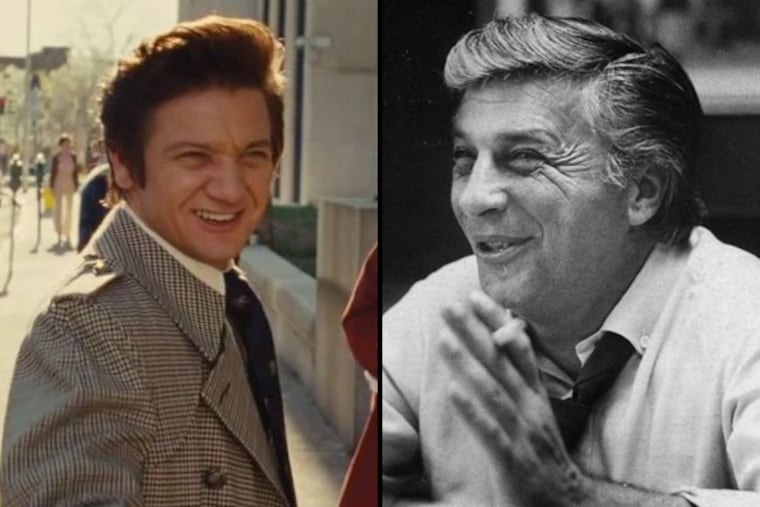'Hustle' casts spotlight on real mayor
CAMDEN In American Hustle, a highly fictionalized telling of the FBI'S Abscam corruption sting of the 1970s, the public official on the take is the most selfless character.

CAMDEN In
American Hustle
, a highly fictionalized telling of the FBI'S Abscam corruption sting of the 1970s, the public official on the take is the most selfless character.
In the film, which opened Friday, Camden Mayor Carmine Polito turns down a briefcase full of money when he is first offered a bribe. The character, based on real-life Mayor Angelo Errichetti and played by Jeremy Renner, later agrees to accept the money because he believes doing so would lead to jobs for residents.
Those who knew him and have studied the long-troubled city agree Errichetti was deeply concerned for his constituents but was a complicated person.
"For all the mayors I worked for, he was the mayor," said Richard Cignalia, who spent more than 40 years in Camden city government and was appointed by Errichetti to be city finance director. "If you went to him with a problem, he was accessible and he really did care about the city."
Cignalia, who had seen only the trailers so far, notes that Renner's version of his boss has the right pompadour. But he was still worried about how he is portrayed.
"I hope he doesn't look like a big crook who didn't care," Cignalia said.
But in the movie, by putting public service first and genuinely befriending the man who would bring him down, he comes off as downright innocent - if you can overlook his willingness to deal with the mob if he thought it was for the greater good.
In real life, the mayor's undoing may have helped push a city already on the brink into an even darker time.
Errichetti was elected mayor in 1973 as his hometown was reeling from race riots two years earlier, and manufacturers and their jobs were disappearing.
"He was pretty impressive in the way he dealt with an incredibly difficult transition in terms of the white working class disappearing overnight," said Howard Gillette, professor emeritus of history at Rutgers-Camden and the author of Camden After the Fall, a history of the city. "It was certainly more than a thumb in the dam."
Gillette, who taught a class this semester on political corruption, credits Errichetti, the last white mayor of a mostly minority city, for working closely with black leaders. He doesn't think Errichetti could have done anything to reverse the city's decline.
By the end of the 1970s, Errichetti also was chairman of the state Senate's budget committee and the undisputed leader of South Jersey's Democratic machine.
Besides trying to restore his city, he was trying to spur redevelopment in Atlantic City. In 1976, voters agreed to allow gambling there, but it would be five years before the first casino opened.
Then came Abscam, the operation at the center of American Hustle.
The movie, a 1970s-era period piece with low necklines and big hair, gets its first of many laugh lines with the words that appear on screen as it opens: "Some of this actually happened."
A con man and the FBI worked together to bribe politicians using two FBI agents pretending to be Arab sheikh investors.
The operation led to 19 convictions, including Errichetti, six members of the House of Representatives, and U.S. Sen. Harrison Williams. Errichetti helped bring other officials into the scheme.
Errichetti was caught on a hidden camera accepting $25,000, which was to be a down payment on a $400,000 bribe.
Cignalia believes that Errichetti, who died in May at 84, thought the phony operation would help him get a job in the casino industry when his political career ended. Instead, he went to federal prison, where he served more than 2.5 years of a six-year term.
By the end of Errichetti's second term, Cignalia said, he was distracted and not effective on budget matters.
It didn't help with city finances that Errichetti refused to raise taxes on his struggling residents, though the same decision had made his reelection a breeze.
The problems led to a partial state takeover of the city government and to some undesirable deals, including a bailout with a price. The state would build a prison on the city's waterfront - the same area where Errichetti had talked of an economic revival.
The prison was torn down in 2009 to make way for development possibilities in what remains one of the nation's most impoverished and violent cities. Nothing has been built there yet.
U.S. Rep. Robert E. Andrews (D., N.J.) was still in school when Errichetti was mayor, but he got involved in politics soon after the mayor was sent to prison.
"The mayor had a chance to really rally the city," said Andrews, who eventually met Errichetti. "He was really popular. He had dominant control over the political machine."
Andrews said the city's focus on recovering from Errichetti's downfall may have been one reason it didn't benefit from the national economic expansion that lasted through most of the 1980s.
And corruption problems would persist in the city, with two of the four mayors who immediately followed Errichetti being sent to prison.
But, Gillette said, Errichetti seems to have been forgiven for accepting a bribe.
"A lot of the people in New Jersey," he said, "they kind of see it as honest graft."